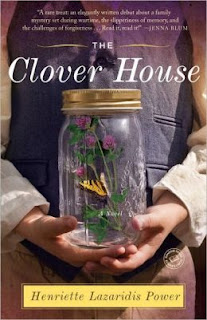 dean for four of those. She is the founding editor of The Drum, a literary magazine publishing exclusively in audio form. A competitive rower, Power trains regularly on the Charles River in Boston.
dean for four of those. She is the founding editor of The Drum, a literary magazine publishing exclusively in audio form. A competitive rower, Power trains regularly on the Charles River in Boston.Her new novel is The Clover House.
From Power's Q & A with Caroline Leavitt:
It took you eight years to write this novel. What was that process like? Was there anything you'd do differently in writing your next novel?Visit Henriette Lazaridis Power's website and blog.
It actually took me both much less and much more time than eight years to write this novel. Let me explain that. When I first contemplated quitting teaching to take up my pre-academia dream of being a writer, I went to the stories I knew best: stories of my parents’ childhood and youth during the Second World War in Greece. I wrote a mediocre novel that had something to do with that (and that will remain in its desk drawer), but when I finally did quit teaching, I began working on another project that had no connection to that earlier narrative. Whenever I took a break from that manuscript, I would tinker with some story or other from World War II, one of which was published in the New England Review. At one point, I set the other book aside, thinking it was done, and I returned to the World War II story. I came up with the character of Calliope Notaris Brown, a 35-year-old Greek-American woman who is wrestling with the legacy of her mother’s life during the war--a legacy she can feel in her mother’s coldness and sorrow, but that she can’t quite understand. Once I had that, I wrote a good draft of the novel in a matter of months. I wrote much of it during the winter, with the curtains to my study closed so that I couldn’t see the passage of time. It was exhilarating, and I treasure my memory of that experience. I hope I’ll be able to capture that feeling again.
At the moment, I’ve returned to that older manuscript once more for a final revision. But for the book after that, which I’ve begun notes for, I want to be better prepared. With The Clover House, I had at least a chronological structure to the narrative, provided by the timeline of Carnival celebrations in Patras, Greece. In the past, I’ve...[read on]
Writers Read: Henriette Lazaridis Power.
The Page 69 Test: The Clover House.
Read--Coffee with a Canine: Henriette Lazaridis Power & Finn.
--Marshal Zeringue





























